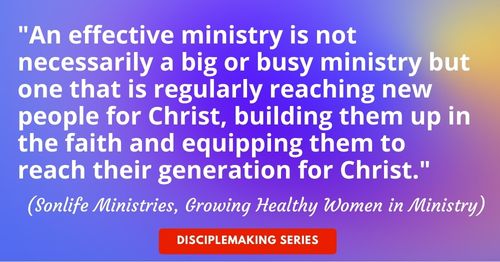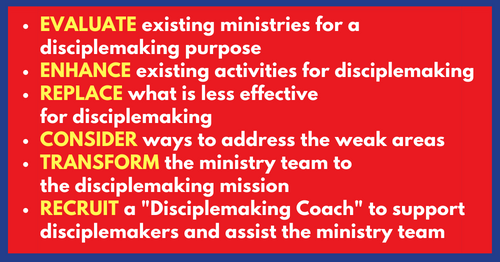Launch • Transition to a Disciplemaking-Focused Women’s Ministry

AI was not used to generate this post.
Has your ministry team been event-driven with one person overseeing Bible studies, another the retreat, & another the Christmas brunch? Does your current women’s ministry need to have more structure and purpose to what you organize and fund? Do you see the same women involved in your ministry with rarely a new face? Do you recognize Jesus’ leading for you to have a greater focus on disciplemaking for the women of your church? If you answered yes to any (or all) of those questions, now is the time to transition your women’s ministry from being event-driven to disciplemaking-focused! You will learn how to do that in this article which is directed toward those who are leaders in ministry to women within a church setting. This is blog #12 in our “Lifestyle Disciplemaking” series, adapted from our book, Leap into Lifestyle Disciplemaking.
Key Takeaways
- Transition your women’s ministry from event-driven to disciplemaking-focused to involve new women.
- Effective ministry encompasses reaching, establishing, and launching new disciples for Christ.
- Define women’s ministry as activities aimed for women to follow Jesus and become disciplemakers.
- Evaluate, enhance, or replace existing activities to align them with disciplemaking purposes.
- Recruit a Disciplemaking Coach to support and guide your ministry’s disciplemaking efforts.
Listen to this blog as a similar podcast:
What effective ministry is

An effective ministry is not necessarily a big and busy one. That is what happens to any growing ministry segment of a church. The more people coming into the church community, the more programs are added to accommodate them. The problem is that programs without real purpose related to all aspects of disciplemaking are missing the mark.
The terms “discipleship” and “disciplemaking” often get confused. Most churches I have attended have been heavily focused on discipleship. As I mentioned in the first blog, discipleship typically refers to the normal process for Christians to grow in their faith through Bible studies, prayer, worship, and small groups. It usually focuses on individual spiritual growth. Discipleship is an essential part of getting established in your faith. But it is only one-third of what Jesus commissioned us to do.
Three phases of effective ministry
The quote above outlines the three phases of the disciplemaking process:
- Regularly reaching new people for Christ (the CONNECT phase)
- Building them up in the faith (the ESTABLISH phase)
- Training and releasing them to reach their generation for Christ (the LAUNCH phase)
Disciplemaking includes seeing people trust in Christ and grow in their faith. It also includes training Christians to reach new people for Christ and help new believers grow in their faith so those can then reach their own peers for Christ.
Women of all ages and stages of life can learn to share their faith and disciple new believers. Wherever women gather, disciplemaking can take place there. Leaders in women’s ministry need to keep all aspects of disciplemaking in mind as they plan activities for the year.
Disciplemaking makes disciples who make more disciples. It is others-focused more than self-focused. Focused is a key concept in a disciplemaking ministry. Where is your focus?
Clarify “women’s ministry”
For purposes of this article, we need to define what we mean by “women’s ministry.” Many church ministries involve women in teaching children’s classes, serving in local missions, and being on the worship team. Those are not considered “women’s ministry.” Women’s ministry is whatever is offered to women and for women so each one can know and live out her commissioned two-fold purpose: 1) to follow Jesus as His disciple and 2) to live for Jesus as a disciplemaker.
Losing a disciplemaking focus
I asked several questions at the beginning of this article.
- Has your ministry team been event-driven with one person overseeing Bible studies, another the retreat, & another the Christmas brunch? This is how most women’s leadership teams are organized. Event-driven. Not disciplemaking-driven.
- Does your current women’s ministry need to have more structure and purpose to what you organize and fund? Often, you do what the women want to do. If you leave planning up to what women want, the result will be lots of fellowship activities with other Christians, and some Bible studies thrown in for developing close friends. Nothing is wrong with having fun together. But Jesus commissioned us to make disciples who make disciples. That begins at the local church and spreads out to those who need Christ. It will not always be comfortable.
- Do you see the same women involved in your ministry with rarely a new face? I was in a church once that was quite exclusive. Only those who had the same values as the leading families were invited to participate in anything. It was closed to nonbelievers and even getting trained to reach out to nonbelievers.
If you answered yes to any (or all) of those questions I asked, you have strayed from Jesus’ commission to every Christian to become a disciplemaker. This is a challenge in all churches. We get comfortable with doing things a certain way and can lose perspective. Now is the time to transition your women’s ministry to a disciplemaking-focused one!
Get our “Lifestyle Disciplemaking” newsletter. Click on this link and choose “Interested in lifestyle disciplemaking” as your experience level. You will receive weekly tips and encouragement for disciplemaking in your life, including stories of what others are doing.
Transition to a disciplemaking-focused ministry
Start with prayer: Ask Jesus to show you the weak areas in your women’s ministry regarding disciplemaking. Ask Him for courage to dissolve change events or activities to encourage disciplemaking. Trust Him to help you see a better way for using your church resources and people to advance everyone into lifestyle disciplemaking. Then, proceed through the following steps.
There is a 6-step strategy to transition your women’s ministry from event-driven to disciplemaking-focused. Download our “Transition to a Disciplemaking-Focused Women’s Ministry” booklet containing the following steps plus a chart we have developed to help you list and evaluate existing ministries.

Step 1: EVALUATE existing ministries for their disciplemaking purpose.
To evaluate existing ministries for purpose and effectiveness in disciplemaking, first list the activities you offer to women, whether ongoing (weekly/monthly) or occasional (once a year).
Consider the primary purpose of each activity and whether you can place that activity under one of these categories: Connect (reaches nonbelievers or prepares women to reach nonbelievers), Establish (grows women to establish strong roots as believers whether long-time or new), or Launch (launches women in their communities to reach their peers for Christ and prepares new leaders to establish believers both inside and outside of the church). If you are unsure about an activity’s purpose, mark it as “Unclear Disciplemaking Purpose.”
Step 2: ENHANCE existing activities for disciplemaking.
Explore ways to enhance existing activities to make them more effective for disciplemaking. This might include:
Connect:
- Making some ministries more receptive for new people, including childcare spots for the unchurched.
- Design the activity more for the community and promote it invitingly.
- Recruiting and preparing designated engagers for specific activities, including follow-up.
Establish:
- Adding a group for beginners to your existing Bible studies.
- Offer a variety of study levels and cross-generational.
- Training your small group leaders for disciplemaking in their groups.
Launch:
- Train and encourage women to connect with nonbelievers, practice telling their faith stories, and practice sharing the gospel message.
- Give training and encouragement to women to start and lead Bible studies outside of church ministries.
Step 3: REPLACE activities less effective for disciplemaking.
Consider how to replace activities that do not have a disciplemaking purpose or have become less effective. That means you have to be willing to change that activity or stop doing it and replace it with something new.
Several years ago, I read a book called Community Is Messy by Heather Zempel. She wrote a whole chapter called “Operation Kaboom.” She said that leaders need to be being willing to “blow things up” when an activity or event is no longer effective at doing what it is supposed to accomplish. Such kabooming requires humility and honesty to recognize that what worked yesterday may not work today—or may never have worked at all!
In the process of “blowing things up” to dissolve or change a favorite activity, her advice is this:
Be humble, be prayerful, be discerning. … Make sure God has initiated the process, and invite Him to be a part of it all the way through. … Be willing to hurt some feelings and offend some people. … Stop doing things that are really good to make way for things that are better. Just because you’ve ‘always done it that way’ doesn’t mean you should keep doing it that way. (Heather Zempel, Community Is Messy, page 168)
This is hard to do. Women do not like change. We get attached and even possessive about ministries we have started or have held together for years. This can cause an angry backlash. I saw this happen several times.
For more information about this, read my blog, “Stop the ‘It’s MY Ministry’ Mentality.”
Heather Zempel recognizes this and brings us back to focus on our purpose.
There may be some [activities] that you really love, that carry sentimental value for many people and that even accomplish good things. But they are no longer the right thing. Be willing to [stop] good things to make way for better things. (Heather Zempel, Community Is Messy, page 168)
When we are truly open to the Lord’s leading, we must be willing to let go of our cherished way of doing things if they are not successfully bringing new people to Jesus, establishing new believers well, and launching everyone into lifestyle disciplemaking. A few tweaks may not fix it. Time to “kaboom!”
Let me insert a caution here. Move slowly with your “Operation Kaboom.” Consider whether that activity can be moved to another church ministry (local missions or hospitality or assimilation) or released to an individual to continue doing it apart from women’s ministry. Whatever you do, always plan a time of celebration and appreciation whenever you end it.
Step 4: CONSIDER new ways to address the weak areas.
First, you have to consider the weak areas from your evaluation above. But I have recognized three general weak areas in a typical women’s ministry:
- The lack of preparedness to befriend and share one’s faith with unchurched women. We have discussed this throughout this series of blogs.
- The disconnected women. Who is left out of your current ministry? Why? Where can you draw them into the community of women so they can grow and be encouraged to reach their peers for Christ? What if they work nights and weekends? Can you offer a variety of times to include them?
- The immediate neighbors. How do you reach the women in the neighborhoods closest to your church? My daughter attended a church that intentionally reached out to the people in the houses and apartments immediately surrounding the church building. Twice a year, the whole congregation went “visiting” in that neighborhood after some preparation taught during the church service.
What do you recognize as the weak areas in your women’s ministry regarding disciplemaking?
Step 5: TRANSFORM the team to the disciplemaking mission.
My husband often uses this phrase, “Match the team to the mission.” He uses it in a business context, but it applies very well in a ministry context. What would that look like in women’s ministry to match the team to the mission?
Match the leadership team members to the process of disciplemaking (Connect, Establish, and Launch) to help you stay balanced in the areas of disciplemaking. By transforming your leadership team to the disciplemaking mission, you can help the women of your church move away from dependence on traditional event-driven ministries and toward a lifestyle of making disciples who make more disciples. The local church is the best venue for disciplemaking to begin.
Transforming your women’s ministry to the disciplemaking mission will help you as a ministry move beyond event-driven leadership. Here is how to do that:
- Match the leadership team members to one of three aspects of disciplemaking (Connect, Establish, or Launch) as a way of staying balanced. Ask Jesus to draw each team member to one of those three aspects of disciplemaking.
- Determine how you will respond when others come to you with a ministry idea. Ask the questions below while praying for guidance:
- What would be the main purpose of this ministry related to Connect, Establish, or Launch?
- Will this ministry activity reach nonbelievers? Will it produce new disciples? Support and fund what will lead to new disciples and disciplemakers.
Download our “Transition to a Disciplemaking-Focused Ministry” booklet. It contains suggestions to help you transform your ministry team to become more disciplemaking-focused.
Step 6: RECRUIT a Disciplemaking Coach to support discipling relationships.
Recruit a “Disciplemaking Coach” to support women in one-to-one discipling relationships and to assist your leadership team in staying focused on your disciplemaking purpose. Ask Jesus to bring someone’s name to mind you could ask—someone who has experience and a passion for lifestyle disciplemaking. Invite her to become a disciplemaking coach for women in your church.
This is what she might do as part of her coaching ministry:
- Advise the women’s ministry team during planning sessions in determining whether existing activities or new ones being considered have any disciplemaking purpose.
- Oversee the designated engagers for activities open to visitors.
- Support and encourage women who are discipling others. Remind them to stay dependent on the Holy Spirit as they are pursuing lifestyle disciplemaking.
- Supply transferable one-to-one discipling resources. Know where they are. Resupply as needed.
Stay Christ-focused as you take the next steps
Remember the purpose of making the transition to a disciplemaking-focused ministry is to prepare and encourage every Christian woman to pursue lifestyle disciplemaking in her daily walk with the Lord. That fulfills our commissioned purpose to follow Jesus as His disciple and to live for Him as a disciplemaker throughout our lives.
Ask Jesus to show you the weak areas in your women’s ministry regarding disciplemaking. Ask Him for courage to dissolve some events or activities to encourage disciplemaking. Trust Him to help you see a better way for using your church resources and people to advance everyone into lifestyle disciplemaking.
If you need help with this transition, invite Melanie Newton to come to your church and lead your ministry team through this “Transition to a Disciplemaking-Focused Ministry” strategy. We will work through each of the above 6 steps together to help you make your women’s ministry more lifestyle disciplemaking-focused.
Disciplemaking is the Lord Jesus Christ’s idea and commission to all of His followers. What He calls us to do, He enables us to do through His Spirit at work in us and in the world. Trust Him to show you what to do as you transition your women’s ministry from being event-driven to disciplemaking-focused. Then, watch what He does!
Let Jesus lead you into lifestyle disciplemaking. Jesus followers become disciplemakers.
Read all our articles in the lifestyle disciplemaking series.
Lifestyle disciplemaking activities are interwoven throughout our Live Out His Love Bible Study of New Testament women and our Leap into Lifestyle Disciplemaking book.
-
Live Out His Love (NT Women)—paperback
$16.00 -
Live Out His Love (NT Women)—printable / fillable
$10.00 -
Live Out His Love (NT Women)—digital reader version
$4.99 -
Leap into Lifestyle Disciplemaking—paperback
$14.00 -
Leap into Lifestyle Disciplemaking—printable
$10.00 -
Leap into Lifestyle Disciplemaking—digital reader version
$4.99
Image credit: Sourced from a template at canva.com.
AI was not used to generate this post.





